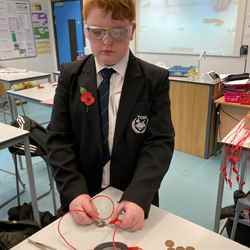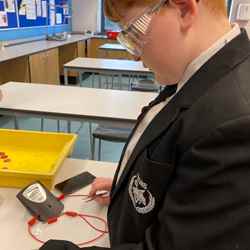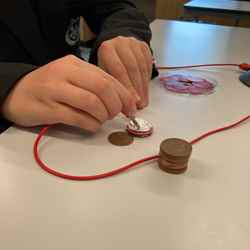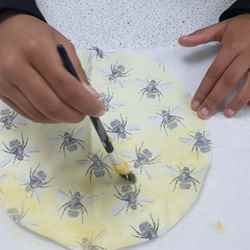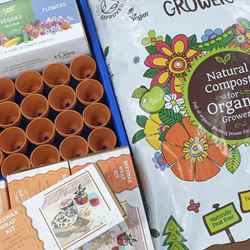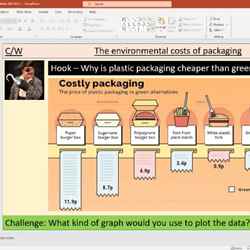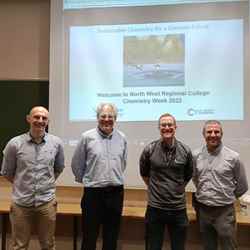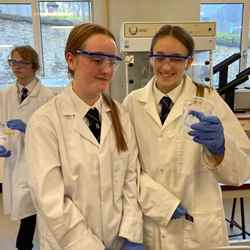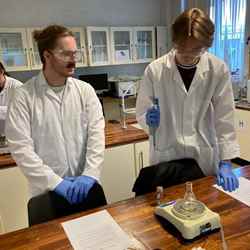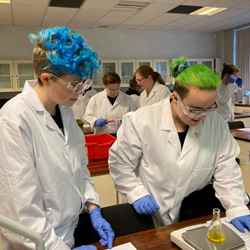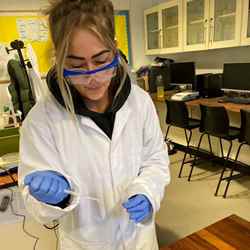Thousands learn about sustainability during eventful Chemistry Week
Schools, colleges and universities across Britain came together to celebrate the power of science with a series of special Chemistry Week activities.
The Royal Society of Chemistry enabled hundreds of young people events up and down the country to get involved thanks for a series of generous grants. As well as 11 Chemistry Week grants worth nearly £4,000, further financial support came from the Outreach Fund.
Some institutions took part in our global battery experiment, which uses coin-operated batteries to showcase how chemistry can drive sustainability. Others went above and beyond, coming up with grand and comprehensive plans to maximise inclusion with all manner of activities.
Here are five stories summing up just some of the experiences enjoyed around the UK during Chemistry Week, which took place on 7-13 November 2022.
Batteries were at the heart of the work undertaken by Dr Ruth Patchett and the team at Turves Green Boys’ School in Birmingham.
After being awarded an Outreach Fund grant, students took part in several activities designed around sustainability by focusing on battery chemistry.
The science club participated in the Royal Society of Chemistry’s Global Battery Experiment. Students made their own batteries using coins and foil, and then compared the effects of changing the electrolyte solution on the potential difference produced. Students managed to get a potential difference of 4.63 volts from their most successful 10-cell battery! They plotted their results online and looked at results students in other countries obtained compared to their own.
In form time, the focus was on the recycling of batteries. This activity was based on research by Professor Peter Slater’s group at the University of Birmingham – just four miles up the road. Students had to think about the challenges of separating the components.
To model this, they used Crunchie bars, with around 400 students carrying out experiments with some basic equipment to separate the chocolate from the cinder toffee most efficiently. Students described their plans, highlighting advantages and disadvantages, and used their knowledge of separating mixtures. Their approaches differed a lot, ranging from dissolving, melting, chopping and filtering to – for some hopeful groups – licking!
We would like to extend our thanks to the Royal Society of Chemistry, Prof Slater, Beatrice Browning, Rosie Madge and all the staff at Turves Green Boys’ School for their support and for making the activities such a success.
Waiki Cheng inspired students at Ravens Wood School, in Bromley, Kent, with a series of practical exercises.
More than two hundred students in Year 7 were able to enjoy this project, which was aided by a Chemistry Week grant and featured two hour-long sessions.
In the first of two one-hour sessions, students looked at global food security and the carbon footprint of common food items, and learned how to calculate the carbon footprint of their packed lunch. They then took the initial step of reducing their carbon footprint by planting more than 100 different types of herbs, vegetables, and pollinator-friendly flowers.
Pupils then explored the environmental costs of plastic packaging in the second session. We looked at how wild animals and their habitats are being negatively impacted by plastic, and what we can do to reduce our reliance on disposable food packaging. The students then made their own organic beeswax food wrappers of different shapes and sizes.
The project was a huge success! Our students found it relatable and emotive, particularly when looking at pictures of wild animals being surrounded by plastic pollution. The hands-on activities of planting their own food and making beeswax wrapper gave the students a real sense of empowerment when it comes to adopting a more sustainable lifestyle. We also had plenty of opportunities for KS3 curriculum linkage to topics including energy transfer, plant cells, nutrition, and states of matter (measuring the melting point of beeswax).
After the final session, two students even asked me if we could go litter-picking during our lunch break.
Diane Smyth writes about how dozens of students at the North West Regional College in Derry, Northern Ireland, learned more about sustainability.
Kindly supported by a Royal Society of Chemistry grant, the science team celebrated Chemistry Week with a mini-conference entitled 'Sustainable Chemistry: A Greener Future'. More than 50 students from the college and local schools heard from four brilliant speakers who utilise chemistry in a variety of more sustainable ways.
We were delighted to hear how Dr Simon Murray, from CASE (Centre for Advanced Sustainable Energy), is using chemistry to develop novel uses for waste products. Our next speaker was Dr Andrew Pedlow explained how the Catagen team are working on chemical means to reduce carbon emissions from engines. Dr Chris McCallum, from Tetra Tech, then identified the means of utilising the chemistry of several biological materials as sustainable alternatives to non-renewable materials. And Professor John Holbrey, from Queen’s University Belfast, explained how the unusual physical properties of ionic liquids can be used for scrubbing material in the removal of harmful substances.
Following talks and lunch, students had an opportunity to synthesise biodiesel from rapeseed oil, which is a major waste product of the food industry. This investigation allowed students to develop key skills, such as centrifugation and separation, and to use specialist equipment, such as micropipettes.
We would like to take this opportunity to thank the Royal Society of Chemistry for the generous support as this event could not have taken place without it.
Hundreds of pupils learned more about plastics, polymers and sustainability thanks to the work of Llinos Lloyd and the team at Bishop Walsh Catholic School, Birmingham.
We reached roughly 350 students this Chemistry Week, running through our biodegradable polymers practical with year seven and eight classes as well as the science club.
As many in these year groups were previously unfamiliar with where plastics come from, we taught them about this and the nature of the problem when it comes to disposing of them. And after learning more about polymers, pupils gained an understanding of the problems associated with them and appreciated why finding alternatives is important.
Making usable solids from potatoes and other biological materials opened pupils’ eyes to how the value of chemistry. Our testing showed them the non-biodegradable polymer is more durable and this was followed up with conversations about sustainability to emphasise the need for new solutions.
Dr Tom Swift talks us through the exercises and experiments laid out at the University of Bradford for visiting college students.
Four groups of A-Level and BTEC chemistry students from two colleges visited our STEM laboratory as part of our Chemistry Week work.
We guided them through the synthesis of either aspirin or banana oil and then followed this up with a tour of our research laboratories and a discussion about issues in the scale-up and manufacture of chemicals.
The students really enjoyed the visit, and it was great to hear their strong opinions on the use of plastics. Many agreed that recycling or improving biodegradability would be better for the environment.
If you are interested in applying for funding to support a chemistry-based outreach activity, please go to our Outreach Fund webpage to find out what support might be available to you.

